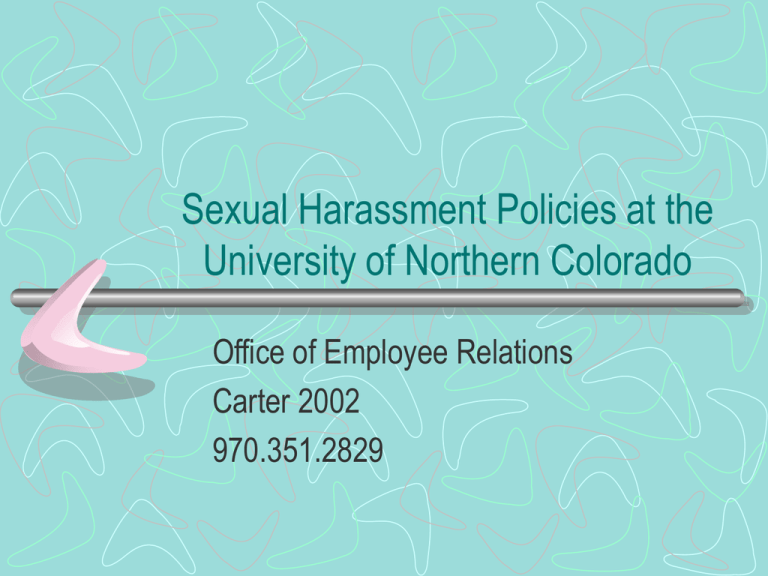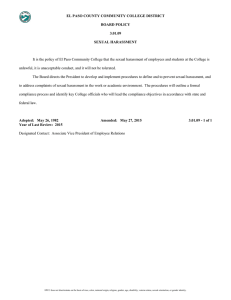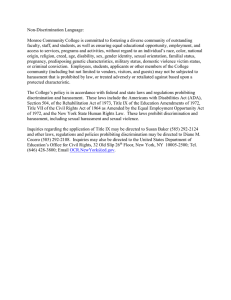
Sexual Harassment Policies at the
University of Northern Colorado
Office of Employee Relations
Carter 2002
970.351.2829
UNC’s Policy Regarding Sexual Harassment
Discrimination of any kind is absolutely prohibited on
campus or in any University programs.
Sexual harassment can be implied from conduct,
circumstances, and relationships.
The office of Employee Relations initiates formal
investigations of sexual harassment.
UNC’s Policy Regarding Sexual Harassment
The University of Northern Colorado
complies with all state and federal laws,
rules, regulations and executive orders
regarding affirmative action, equal
opportunity and civil rights. It is the policy of
the university to maintain the University as a
place of work, study and residence, free of
discrimination, sexual harassment and
exploitation of its students, faculty, staff and
administrators. Discrimination of any kind is
absolutely prohibited on campus or in any
University programs. Sexual harassment is
considered a form of discrimination for the
purposes of this policy. Coercive sexual
behavior and unwelcome sexual attention
are offensive, and undermine the safety,
security and dignity of all members of the
University community.
UNC’s Policy Regarding Sexual Harassment
The University is committed to take appropriate action against those who violate the
University’s policy prohibiting discrimination and sexual harassment, including corrective
and disciplinary action. In addition, the University will take all reasonable steps to prevent
or eliminate discrimination and sexual harassment by non-employees, including customers,
clients and suppliers, who are likely to have workplace contact with our students, faculty or
employees.
The information provided here is provided to increase understanding on campus regarding
the issues of sexual harassment. Our intention is to increase prevention of these behaviors
in the University setting, and to enable University members to receive a quick response
when they occur.
SEXUAL HARASSMENT DEFINED
Sexual harassment is a form of sex discrimination, which is illegal under Title VII of the
Civil Rights Act of 1964 for employees and under Title IX of the Education Amendments of
1972 for students. Sometimes it is ambiguous and even unintentional: the person whose
behavior offends may be genuinely unaware of the discomfort and distress it causes.
UNC’s Policy Regarding Sexual Harassment
Sexual harassment can be verbal, visual or physical. It can be overt, as in the suggestion that a
person can get a higher grade or a raise by submission to sexual advances. The suggestion or
advance need not be direct or explicit—it can be implied from the conduct, circumstances, and
relationship of the individuals involved. Sexual harassment can also consist of persistent,
unwanted attempts to change a professional or educational relationship to a personal one. It can
range from unwelcome sexual flirtations and inappropriate put—downs of individual persons or
classes of people to serious physical abuses such as sexual assault and rape.
Examples include, but are not limited to, unwelcome sexual advances; repeated sexually oriented
kidding, teasing, joking or flirting; verbal abuse of a sexual nature; graphic commentary about an
individual’s body, sexual prowess, or sexual deficiencies; derogatory or demeaning comments
based on a person’s gender, whether sexual or not; leering, whistling, touching, pinching, or
brushing against another's body; offensive crude language; displaying objects or pictures which
are sexual in nature that would create hostile work or living environments.
UNC’s Policy Regarding Sexual Harassment
Such conduct is coercive and threatening and creates an atmosphere that is not conducive to
teaching, learning and working.
For general policy purposes, sexual harassment may be described as unwelcome sexual
advances, requests to engage in sexual conduct, and other physical and expressive behavior or a
sexual nature where:
1) Submission to such
conduct is made either
explicitly or implicitly a term
or condition of an
individual’s employment,
course grade or status in an
academic program;
2) Submission to or
rejection of such conduct by
an individual is used as the
basis for employment or
academic decisions
affecting such individual; or
3) Such conduct has the
purpose or effect of
unreasonably interfering
with an individual’s work or
academic performance, or
creating an intimidating,
hostile, or offensive working
or learning environment.
UNC’s Policy Regarding Sexual Harassment
A lesser known form of sexual harassment is called third part. Third party sexual harassment is when a person
is not a direct target of sexual harassment, but is offended by such behaviors occurring in his/her work
environment. Either men or women can be harassed by members of the same or opposite sex. UNC’s policy
prohibits all forms of sexual harassment.
WHAT TO DO IF YOUR ARE SEXUALLY HARASSED
•Seek support from a friend,
colleague or counselor.
•Keep a written record, documenting, as precisely a
possible, what happened, when it took place, the names of
witnesses if any, the victim’s response, and any other
information that may be helpful later.
•Find out whether other
student’s and/or employees
have also been harassed
and whether they could offer
corroborating testimony.
•Request assistance from
the office of Employee
Relations.
•File a complaint with the
office of Employee
Relations, which initiates a
formal investigation, and
resolution of the complaint.
UNC’s Policy Regarding Sexual Harassment
REASONS WHY YOU SHOULD REPORT SEXUAL HARASSMENT
The impact of sexual harassment on a student’s educational experience or an employee’s work environment
and/or the attainment of future goals can be significant and should not be underestimated.
Harassing behavior, if ignored or not reported, is likely to continue and become worse rather than “go away.” In
addition, unless a sexual harassment experience is reported, the University cannot take remedial action.
PROTECTION FROM RETALIATION
No reprisal or retaliation of any kind shall be taken against an individual who in good faith complains of
discrimination or sexual harassment, or who participates in any procedure to address a complaint regarding
discrimination or sexual harassment. The University is committed to protecting victims of discrimination or
harassment from retaliation and any University employee or official who is in violation of this non retaliation
policy will be subject to discipline.
FACULTY MEMBER AND SUPERVISOR RESONSIBLILITIES FROM DEALING WITH SEXUAL
HARASSMENT
Duty to report: As an officer of the University, you are required to report immediately any conduct that appears
to be sexual harassment. Reports should be directed to your supervisor and to the director of AAEO, Employee
Relations.
UNC’s Policy Regarding Sexual Harassment
Responsibilities: As an administrator or faculty member, you must uphold University policy prohibiting sexual
harassment. It is your responsibility to maintain an environment that allows students and employees to study
and work free from harassment.
CONFIDENTIALITY
The University will keep the information reported as confidential as possible, consistent with State and federal
laws, and both the complainant and the respondent will be given an equal opportunity to present their cases.
RESOURCES AVAILABLE:
Employee Relations: 970.351.2829, Carter Hall 2002
Dean of Students: 970.351.2796, Carter Hall 3005
Counseling Center: 970.351.2496, Cassidy Hall





